Clifford Garstang's Blog, page 121
September 19, 2011
The New Yorker: "Dog Run Moon" by Callan Wink
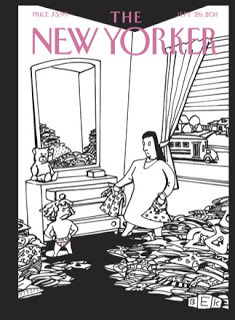
September 26, 2011: "Dog Run Moon" by Callan Wink
Sid is on the run from Montana Bob and Charlie Chaplin whoare chasing him because Sid stole Bob's dog. Sid prefers to think of the act asone of "liberation," however; the dog had been chained up and depressed untilSid freed him. Sid is literally running, though, and because he's a nudesleeper, he's not wearing any clothes (since Sid and Charlie came to his housein the middle of the night to reclaim the dog). Nude isn't the real problem,although he's going to get very cold when he stops; he's also barefoot, and theterrain is chewing up his feet.Meanwhile, the dog is running with him and seems content.Sid, though, is thinking about his ex-girlfriend, also a nude sleeper, for whomhe still has strong feelings.
It's a good story about freedom and loss, and the language is more lyrical (with quirky dialogue--is that how they talk in Wyoming?) than the normal New Yorker story. And although it'swonderfully implausible, it isn't hard to suspend disbelief. It's also a jumbleof time, but easy to keep track of. It's a nice big splash for a youngwriter. Check out the Q&A with Callan Wink.
Published on September 19, 2011 17:15
Fall for the Book
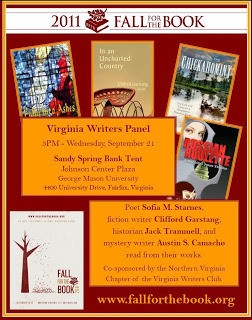 I've been so busy this month that I haven't had time to think about this, but it is now upon us. This Wednesday I'll be appearing in Northern Virginia at the 2011 Fall for the Book festival at George Mason University. I'll be part of a group of four readers sponsored by the Northern Virginia Chapter of the Virginia Writers Club.
I've been so busy this month that I haven't had time to think about this, but it is now upon us. This Wednesday I'll be appearing in Northern Virginia at the 2011 Fall for the Book festival at George Mason University. I'll be part of a group of four readers sponsored by the Northern Virginia Chapter of the Virginia Writers Club.I'm really looking forward to reading with Sofia, Jack, and Austin!
Published on September 19, 2011 15:49
September 16, 2011
Guest Post: All the Roads That Lead from Home by Anne Leigh Parrish
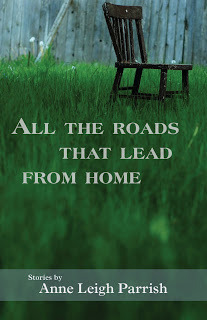 I asked Anne Leigh Parrish to tell us something about the origin of the stories in her new book:
I asked Anne Leigh Parrish to tell us something about the origin of the stories in her new book:"The elevenstories in All The Roads That Lead From Home take place or are associated with the fictional town of Dunston, NewYork. Dunston represents Ithaca, home ofCornell University, where I was born. Atfourteen I moved out of state. When I wentback, many, many years later, I found the town had never left me. It was a shock to feel how strong my memorieswere, and how deep they went. One way oranother, the stories I wrote afterwards set themselves there.
"The Dunston in my collection may resemblethe real town only on the surface. There's the lake, the rolling hills, the brutal winters. The campus and the gorges appear, too, alsothe problem of student suicides that made the papers last year. To my mind, an outline of place is enough to evoke the fuller substance,if rendered carefully. I hope Isucceeded.
"As I was seized by the past, so arethe people in my stories. A woman isvisited by her mother's ghost who takes up residence in order to deliver acryptic message of redemption. Anothergrapples with a long-held belief that her father doesn't love her. One is haunted by a lie she told as a way tocope with her sister's death.
"Overall I'd say that my goal with the collectionwas to suggest that while roads take us away from home, they can, quiteunexpectedly, return us to what we left behind and what might claim us oncemore."
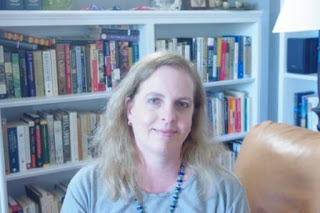 For more information, visit Anne's website, Anne Leigh Parrish, or her book's page at Press 53: All the Roads That Lead from Home.
For more information, visit Anne's website, Anne Leigh Parrish, or her book's page at Press 53: All the Roads That Lead from Home.
Published on September 16, 2011 10:48
September 15, 2011
SWAG reading series open to all book lovers | The News Leader | newsleader.com
SWAG reading series open to all book lovers | The News Leader | newsleader.com:
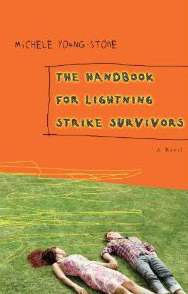 There is a great article in today's Go! Magazine (supplement to the Staunton News Leader) about SWAG Writers (the Staunton Waynesboro Augusta Group of Writers) and the reading event that is happening this Saturday, September 17, at 5pm, at the Darjeeling Café in Staunton.
There is a great article in today's Go! Magazine (supplement to the Staunton News Leader) about SWAG Writers (the Staunton Waynesboro Augusta Group of Writers) and the reading event that is happening this Saturday, September 17, at 5pm, at the Darjeeling Café in Staunton.
I'm excited that Michele Young-Stone is coming to town to read with us. I know the crowd is going to love hearing her read from her terrific novel, The Handbook for Lightning Strike Survivors (and possibly some new work, as well).
And, as the article mentions, I will also be reading. I'll read some from my book, In an Uncharted Country, and I might read a little from my forthcoming book, too.
We have lots of fun at these events, so I hope lots of people turn out!
 There is a great article in today's Go! Magazine (supplement to the Staunton News Leader) about SWAG Writers (the Staunton Waynesboro Augusta Group of Writers) and the reading event that is happening this Saturday, September 17, at 5pm, at the Darjeeling Café in Staunton.
There is a great article in today's Go! Magazine (supplement to the Staunton News Leader) about SWAG Writers (the Staunton Waynesboro Augusta Group of Writers) and the reading event that is happening this Saturday, September 17, at 5pm, at the Darjeeling Café in Staunton.I'm excited that Michele Young-Stone is coming to town to read with us. I know the crowd is going to love hearing her read from her terrific novel, The Handbook for Lightning Strike Survivors (and possibly some new work, as well).
And, as the article mentions, I will also be reading. I'll read some from my book, In an Uncharted Country, and I might read a little from my forthcoming book, too.
We have lots of fun at these events, so I hope lots of people turn out!
Published on September 15, 2011 05:02
September 13, 2011
James River Writers
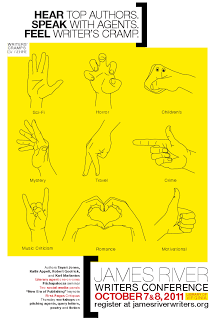 The James River Writers Conference is next month (Oct. 7-8). You should go. It's pretty excellent.
The James River Writers Conference is next month (Oct. 7-8). You should go. It's pretty excellent.It's in Richmond, VA, at the Library of Virginia. It has terrific speakers (not me this year, unfortunately, but still). It's fun and informative.
Published on September 13, 2011 11:17
September 12, 2011
The New Yorker: "Starlight" by Ann Beattie
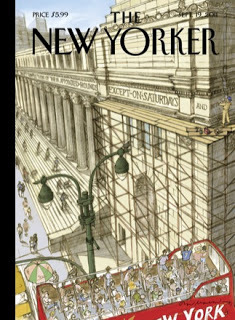
September 19, 2011: "Starlight" by Ann Beattie
This week's "story" is an excerpt from Ann Beattie's new "novel,"although it isn't clear that the book is really a novel, and this excerptcertainly isn't a story. The portrait it gives of Richard Nixon and his familythrough the eyes of Pat Nixon is somewhat amusing, but to what end iscompletely unclear. I like Beattie's work, but this struck me as a waste ofvaluable space in the pages of The New Yorker.
On the other hand, the Q&A with Ann Beattie on thewebsite is interesting, and I recommend that.
Published on September 12, 2011 18:39
September 11, 2011
Have the terrorists won?
 My friends Mary Ann and Stan were visiting from Chicago. They had left the house to go for a long run, and I was straightening up. We had planned to go on a hike and then cook a nice dinner later, so I wanted things to be orderly.
My friends Mary Ann and Stan were visiting from Chicago. They had left the house to go for a long run, and I was straightening up. We had planned to go on a hike and then cook a nice dinner later, so I wanted things to be orderly.I flipped on the TV in my bedroom to check the stock futures and that's when I sawthat a plane had flown into one of the towers of the World Trade Center. Iassumed, as did the commentators, that it was a private plane accident—because, really, whatelse could it be. But then the second plane hit, and the accident was ruled out.Details began to trickle in. I watched. Mary Ann and Stan got back from theirrun and I pulled them into my bedroom to see what was happening. There was wordof an attack in DC. The towers fell.
We were, of course, horrified. But what could we do? Whatgood would be served by watching the news coverage of the tragedy—already labeled aterrorist attack—whenthat coverage would surely reveal little actual "news" and would, most likely,simply show the images over and over and over again. So we prepared for ourhike. We'd leave the TV behind. We'd find out what was going on later.
A friend called from DC. He's also a friend of Stan and MaryAnn's. He was on his way, he said. His government office building had beenevacuated and he didn't want to go home. So he was coming out to see us—150 miles from the city.It complicated things, but we figured we'd make it work. I didn't have acellphone then, but we'd deal with it.
And so we headed to Crabtree Falls, a beautiful trail in theGeorge Washington National Forest not far from where I live. It was a gorgeousday—just like inNew York and Washington—andthe woods were beautiful. Quiet. Peaceful. We didn't talk much. We walked. Wewere calm. We thought. Mostly I thought about how grateful I was not to bealone.
Somehow we managed to rendezvous with our DC friend. We madedinner—I don'trecall what it was—andthen talked about what had happened. And our DC friend watched TV, although therest of us could not.
That's how I spent the day. Since then, I've been horrifiedto witness the changes in our country. So many Americans have channeled theiranger in ways that will almost certainly make things worse, that it makes methink that the terrorists accomplished even more than they thought they wouldor could. A deep wedge has been driven between Americans. And some Americansseek exploit that division for political gain. Our discourse has never beenless civil—at leastnot my lifetime.
But I don't think the situation is hopeless. I would like tothink that all of us would understand that the way we defeat terrorism isremember who we are—theUnited States. We are one country—notjust a country of conservatives and liberals, but a country of Americans. Whycan't we share the sacrifices needed to make our country strong again? Why can'tAmerican investors accept slightly lower profits from corporations in order toput more people to work? Why can't the wealthy agree to pay slightly highertaxes in order to put our financial house in order, and in order to ensure thatno American goes hungry or is denied medical treatment? Why is that asking somuch? Because if it is asking toomuch, then we're doomed.
Published on September 11, 2011 08:41
September 9, 2011
The New Yorker: "An Anonymous Island" by Yi Mun-yol
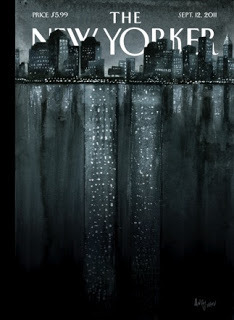
September 12, 2011: "An Anonymous Island" by Yi Mun-Yol
What is this, Asia month? Last week we had Haruki Murakami,the great Japanese writer. This week it's Yi Mun-yol, a Korean writer. Shall weexpect a Ha Jin story next week?
Not that I'm complaining. As an "old Asia hand," I lovethese writers and always enjoy reading their work. And we haven't seen nearlyenough of Yi (this story prompted me to order one of his books, in fact).
The story is set in Korea, although that isn't specified. Husband and wife are watching TVand the husband seems to disapprove of what he sees. He complains, "How did itget so easy to be anonymous?" If it's Seoul where they live (the story doesn'tsay, but it's not a rural village in any case), his complaint is reasonable,and it makes him long for his childhood home. The husband's rant sparks thewife's memory of an incident from long ago—the real story here.
She was fresh out of college and was sent to teach in aremote elementary school. It's a village that is essentially just one clan—everyoneis related either by blood or marriage—so anonymity is impossible. And yet,there's an odd stranger in town, Ggaecheol, who can't be explained. And,eventually, the wife discovers a secret about Ggaecheol and why he is tolerated.And, just to make things interesting, she becomes embroiled in the secret.
Lots to enjoy about this story, especially if you're at allinterested in Asia generally and Korea specifically. There's very goodinformation, too, in the Q&A with the translator, Heinz Insu Fenkl.
Published on September 09, 2011 07:40
September 7, 2011
Shenandoah: Vol. 61, No. 1, Fall 2011
 Shenandoah, the Washington & Lee Review, has completed its transition to being an online magazine (except that it still requires postal submissions, so maybe the transition isn't really complete). In any event, it looks like they've got some good reading. Check out the first online issue.
Shenandoah, the Washington & Lee Review, has completed its transition to being an online magazine (except that it still requires postal submissions, so maybe the transition isn't really complete). In any event, it looks like they've got some good reading. Check out the first online issue.
Published on September 07, 2011 13:17
The New Yorker: "Town of Cats" by Haruki Murakami
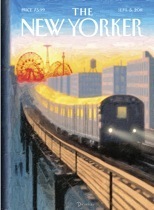
September 5, 2011: "Town of Cats" by Haruki Murakami
This "story" by Murakami is excerpted from his new long novel, coming out this year in English. (For a nice change, this one is not hidden behind TNY's pay wall.) According to the interview with Murakami, the novel goes back and forth between realities. This piece, though, is mostly realistic, except for the internal story that Tengo, the protagonist, reads—"Town of Cats"—which is anything but realistic.
The excerpt stands reasonably well on its own, although it leaves a lot of questions unanswered. Tengo decides to hop on a train and go to visit his father who is in a sanatorium where he is being treated for a "cognitive disorder" (Alzheimers?). We learn that Tengo and his father are estranged, and that the father may or may not really be Tengo's biological father. There is a shadowy memory Tengo has of seeing his mother with another man, and he is convinced that she didn't die, as the father has always maintained.
On the train, Tengo reads the story about a man who arrives in a village occupied entirely by cats. Intriguingly, when the cats smell the presence of humans, the man is convinced he is done for, but the cats can't find him. When he tries to leave on the train that brought him, the train won't stop—as if the engineer doesn't see him. While the relevance of the story Tengo reads isn't clear in this excerpt, it isn't hard to imagine how it could be important to the novel as a whole. Murakami says as much in the interview: "In any case, this episode performs a symbolic function in the novel in many different senses—the way a person wanders into a world from which he can never escape, the question of who it is that fills up the empty spaces, the inevitability with which night follows day. Perhaps each of us has his or her own 'town of cats' somewhere deep inside—or so I feel."
Tengo arrives at the sanatorium and has an awkward visit with his father, in which they discuss the story about the cats, and also Tengo's questions about his mother—questions that don't get answered. Read the book, I suppose. Enjoyable "story," though, so I just might.
Published on September 07, 2011 05:53



